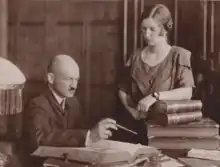Stanisław Bobiński
Stanisław Feliks Bobiński (Polish pronunciation: [staˈɲiswaf bɔˈbiɲskʲi]; Russian: Станислав Янович Бобинский; 1882-1937) was a Soviet communist politician, journalist and military commander of Polish origin.[1] Born November 20, 1882 in Warsaw to a gentry family. In 1910 he graduated from the faculty of philosophy of the Jagiellonian University of Kraków. He continued his studies at the Academy of Forestry in Dresden, where he received his diploma in 1911. In 1913 he returned to Warsaw and became a member of the committee of the SDKPiL party. Evacuated from Warsaw in 1915, he moved to Moscow, where in 1917 he also became an active member of the Bolshevik Party. He was one of the directors of the Polish-language Trybuna newspaper published in revolutionary Moscow and a notable promoter of the communist movement among the Polish expatriates in Russia.

A representative of the SDKPiL at the Brest peace talks, after the end of World War I in Russia he started to organize the Red Regiment of Revolutionary Warsaw, a military unit of the Red Army composed primarily of Poles. With time the regiment grew to become the core of the Western Rifle Division, later renamed to the Soviet 52nd Rifle Division, of which Bobiński was a commissar. During the Soviet offensive on Warsaw during the Polish-Soviet War, Bobiński became the secretary of propaganda in a shadow government formed by the Communist Party of Poland (the Provisional Polish Revolutionary Committee). However, the Soviet defeat in the battle of Warsaw brought his career to an end.
He continued his career as a Russian communist politician and at various times he was a delegate to the Comintern and Communist Party General Committee. In 1929 he was demoted of most his party posts and became a head of a technical museum in Moscow. He was arrested in the evening of June 15, 1937 by NKVD during the Great Purge and was sentenced to death by Kolegium Wojskowe Sadu Najwyzszego CCCP, (based on the decree CKW CCCP from 1.12.1934). He was executed by firing squadron on September 20, 1937 for "espionage and terrorist activities, as well as, having knowledge of other members terrorist' tendencies, while participating in POW against CCCP." The court session lasted 20 min. and execution took place on that day. He was exonerated by Russian government between 1955–1956.